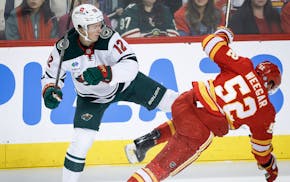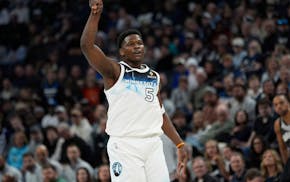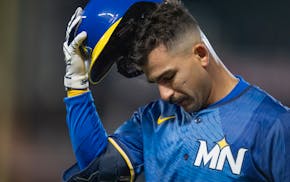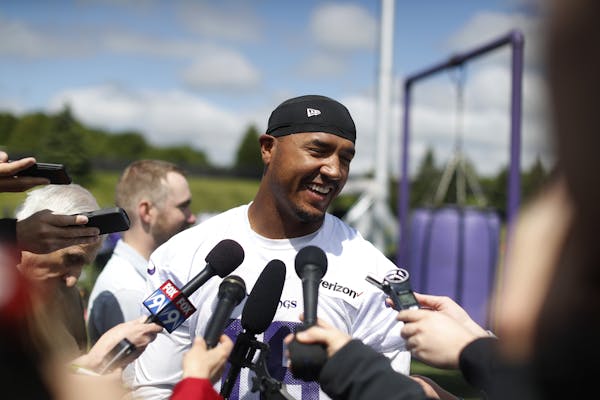Bud Grant isn't the person Bud Grant sees when he pictures the one image that best represents the 56-year history of a Vikings franchise that played in four of the first 11 Super Bowls.
"For me, it's Jim Marshall," the iconic Hall of Fame coach said. "There's a picture of him that I have that says it all. He's standing on the football field. Everything's all muddy. It's snowing. And Jim's got that look. He represented the Vikings better than any player we've ever had. He and Mick [Tingelhoff]. The absolute cornerstone of the Minnesota Vikings. That's Jim Marshall."
Grant has felt that way for close to half a century now. Yes, he was thrilled when Tingelhoff, his other longtime team captain, reached the Hall of Fame in 2015, 37 years after Tingelhoff retired. But Grant considers the quest for Canton only half finished as long as Marshall goes without a gold jacket for what now has been 38 years since he retired in 1979.
"It's one of the big injustices in football," Grant said. "It's a problem that needs fixing."
The Vikings have stepped up efforts to do just that. Ownership campaigned for Marshall during the NFL owners meetings in March. Meanwhile, behind the scenes, it's the no-nonsense 90-year-old Grant who will be reaching out to selectors this week.
"Just give me the names and I'll do whatever it takes," was Grant's reaction when asked to spearhead communication with voters. "I love Jim Marshall. He's one of the most unique guys I ever coached. When I talk about him, it won't be a bunch of baloney, either. I haven't done this a lot. I haven't stepped up to this degree, so I think the credibility is there."
Because Marshall's career ended longer than 25 years ago, his route to Canton must go through the nine-member senior selection committee first. Tingelhoff was Minnesota's first senior committee finalist the year he was enshrined.
In late June of each year, the senior committee receives a preliminary list of 80 to 90 candidates to consider. Marshall is on that list this year, as he has been for years.
That initial field is reduced to 15 semifinalists in a mail-in vote by the full senior committee. After that, five senior committee members travel to the Hall of Fame in Canton, Ohio, in early August. Two current Hall of Famers also are brought in as consultants to discuss the semifinalists.
Once the discussions are complete, the Hall of Famers leave the room and the five senior committee members settle on one or two finalists, depending on the year. This year, there will be two senior finalists that will be presented to the full 48-member selection committee in Minneapolis the day before Super Bowl LII.
To clear the final hurdle, a senior finalist, like a modern finalist, must receive 80 percent of the vote of the full committee. And then, well …
"I know it changed Carl Eller's life when he went in," Marshall said earlier this month while sitting with his wife, Susan, in their home in St. Louis Park. "He seemed like a different person after he went in. I can't figure out how in the world it would change my life other than it would be good for my grandchildren and great-grandchildren to see. But it definitely would be a good thing and, surely, I would faint."
Numbers are there
Marshall appreciates the effort his former team is putting forth to bring a renewed awareness to a 20-year career that began in Cleveland in 1960 and ended with 19 years as an original Viking. But Marshall also says he's been pretty successful in blocking out disappointments like the Hall of Fame and losing four Super Bowls.
"When you see your name there and you have high hopes and then you don't get in, of course it creates a lot of anxiety," he said. "But I don't particularly like giving in to that feeling. I'm a guy who loves life. I'm not mad. I love living."
Jim and Susan were married nine years ago and still interact like newlyweds. The 79-year-old Marshall credits Susan for lifting him out of a depression caused by the chronic pain of being the quintessential NFL ironman.
"She's like an angel from heaven," Marshall said. "I call her my angel all the time. She makes sure I take my pills and do my exercises and get out of the house. She even thinks of things to trick me into getting out of the house."
Marshall made two Pro Bowls. His 127 sacks rank second in franchise history behind Eller (130). His 29 opponent fumble recoveries are tied with Jason Taylor for most in NFL history. And, of course, he never missed a game. His consecutive games played (282) stood as a record for a position player until Brett Favre broke it as a Viking in 2009.
"His body would bend," Grant said, "but it never broke."
Marshall said he just "willed" his body to show up every week, no matter what. He's paying the price for that, and then some, in retirement.
Doctors' bills
Asked to recount all of his surgeries, Marshall says, "I better start at the bottom and go up.
"I've had the [right] ankle operated on twice. I've had numerous knee surgeries, but I have two replacements now. I've got two artificial hips. I've had five operations on one shoulder and six on the other."
Wait. There's more.
"I've had six back surgeries, including two major fusions. I've had neck surgeries, eye surgeries, three heart surgeries, an ear operation. I can't think of anything else other than some minor things, like my hands."
Marshall said he also experiences back pain and headaches every day. He has been in a brain health study at the Mayo Clinic the past five years, but no one can pinpoint what's causing the headaches.
"He just manages the pain with medication and, I think, a great attitude toward life," Susan said.
"I am lucky," Marshall said. "My mind is sharp. I've had tears in my eyes with some of the guys I played with. It's devastating to be with a guy who you used to joke and play around with, and now he doesn't even recognize you. That's tough, man. I feel very bad for their lives and very thankful for mine."
Like a cat
Asked if he ever regrets playing football, Marshall shakes his head.
"I would have done it again," he said. "But I would have assumed a physical regimen like the guys have today. I would have taken better care of my body 12 months a year."
When Marshall played, teammates often joked about "the nine lives of Jim Marshall." Grant once ruled him out of a game against Dallas because Marshall was in the hospital in an oxygen tent for acute asthmatic bronchitis. But Marshall sneaked out of the hospital just in time to arrive at the stadium, start and play the whole game.
"I had three sacks that day," Marshall remembers.
Grant said one of the smartest things he ever did upon taking the Vikings job in 1967 was making Marshall a captain. Marshall was in his eighth NFL season but had never been a captain. Without that move, Grant has his doubts as to whether his program would have worked in Minnesota.
"Whatever I said, Jim was the first guy in line," Grant said. "When I first got here, if I said take a lap, everybody looked to Jim Marshall. If Jim went, they'd all follow. They were like a bunch of goats following Jim."
Sticking up for Bud
Marshall remembers teammates making fun of Grant's approach at first.
"He wanted everything perfect, and there's no perfection in football," Marshall said. "He got teased a lot at first. He'd call a drill and guys would say, 'Mickey Mouse drill.' "
But as Grant said to Marshall, "Jim, you bought a ticket to the ride." And everyone else followed.
"I'd do whatever he said without reservation," Marshall said. "I would do everything he wanted in the way he wanted me to do it. No complaining. And having fun. And keeping everybody happy. Guys would say, 'Mickey Mouse drill,' and I'd start singing 'Mickey Mouse' while doing the drill exactly how Bud wanted it done."
Marshall's mother, Ann, died when Marshall was 17 years old growing up in Kentucky.
"She died in my arms one morning fixing breakfast for me before I went to school," Marshall said. "That influenced my life a lot. From then on, I was determined. It changed me. I wanted to do something, to be something, to make something big out of my life."
His father, George Lorraine Marshall, and grandfather, George Washington Marshall, always told him he could do anything he set his mind to if he were willing to make sacrifices.
"I didn't quite accomplish all the things I wanted to, but I sure tried," Marshall said. "I sacrificed. I gave it my best shot."
Cheating death
Marshall also appreciates life because he thought his would end in the summer of 1980. Looking for a new form of excitement after 20 NFL seasons, Marshall bought a glider plane, assembled it himself and took to the skies above Bloomington Jefferson High School.
The plan was to land safely on the football field. But …
"The wind came in behind me and I lost lift dropped about 500 feet," Marshall said. "I hit the lights above the field and the plane tilted to the left as it hit the ground."
Marshall's plan, he said, was to break his fall by slapping his left arm on the ground at impact. He has the long scar on the arm to prove that was a flawed plan.
"I slapped the ground and the ground slapped me back," Marshall said. "Snapped my arm right in two. And I lost an inch and a half of bone out of my [left] leg. The impact snapped the leg and my foot came back and hit me in the groin."
Had he not crashed, Marshall thinks he probably would have ended up coming out of retirement for a 21st season.
"I broke myself up so bad, I couldn't come back," Marshall said. "I thought I was dead. I thought I was going to die. But nope. Still here. Going to be 80 this year. Still love my life. No matter what."
Neal: As Lynx teams of legend crowd the Basketball Hall of Fame, we recall the good times
Will Bueckers have same impact on WNBA as Clark?

Wild crash against Flames, shunt their playoff prospects into shaky territory

Wolves rout Nets but lose Edwards for Sunday's regular-season finale

